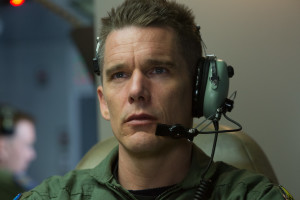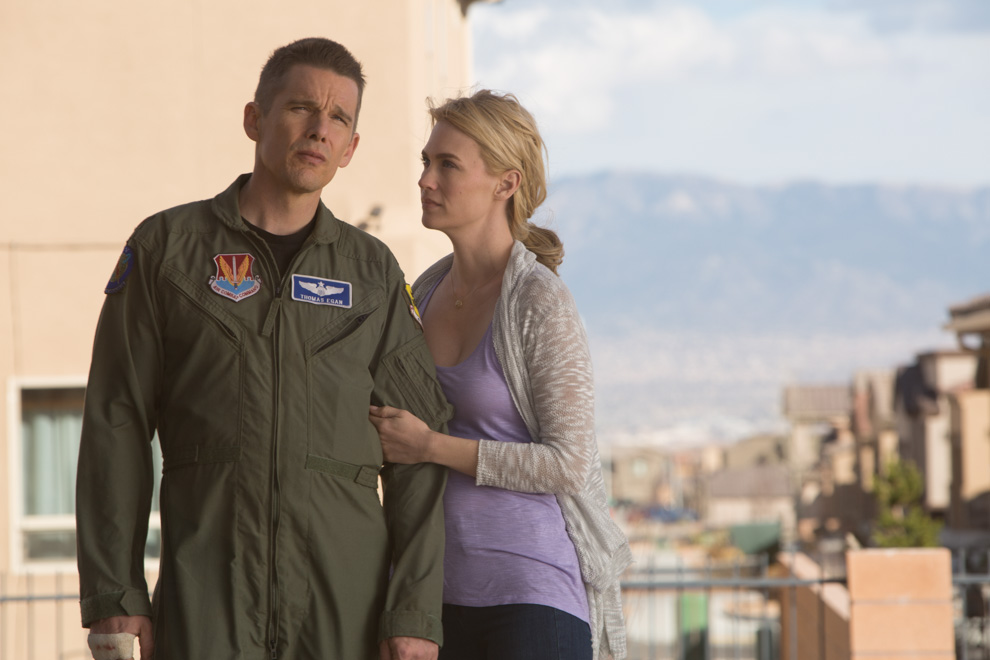In director Andrew Niccol’s “Good Kill,” military officers dispassionately utter the word “splash” every time an enemy target is successfully shot. The indifference and stodginess consistently attached to this catchphrase — following the murders of alleged terrorists or innocent victims in deadly zones of the Middle East by the U.S. army — adequately mirrors the monotony of the film itself. At best, “Good Kill” delivers a mediocre attempt at dissecting a serious issue in modern American warfare — namely, the use of drones. Although its subject matter is worthy of exploration, the feature falls short of producing an alluring and persuasive narrative. Stale and platitudinous, “Good Kill” misses the mark in a number of arenas: The story is dull, the performances are unconvincing, the portrayal of the military is stereotypical and any sort of deeper meaning is practically non-existent. Though intriguing, “Good Kill” amounts to little more than an enormously frustrating misfire.

A U.S. Air Force pilot formerly working on the battleground, Major Thomas Egan (Ethan Hawke) is an alcoholic — most probably suffering from post-traumatic stress disorder (PTSD) — who dislikes his job as a drone pilot. It is a position that feels devoid of risk; he basically controls the aircraft from a cubicle, never being in the air himself. As Egan struggles with the burden of war memories, his wife, Molly (January Jones) is perpetually at a loss. Fellow officers, including Airwoman Vera Suarez (Zoë Kravitz), do not fare much better in the effort of making Egan recover from his wounds. Ultimately, the ethical concerns attached to the job — in which “good kills” are a prerequisite — are too much for a single man to handle.
Viewers could start the film at any arbitrary minute-mark within its sequence, without losing so much as a speck of the film’s message, so dry is it in its cyclical repetition. True, movies need not be action-packed to yield purpose or meaning. Yet, if tragedy is to be devoid of any sort of tension or viewer engagement, then at the very minimum its performers should be able to support the stasis. Hawke, however, is one-dimensional in his rapport with every character in the film, in his least Hawk-ian role to date. His relationship with his wife, aimed at being strained and fraught with drama, is especially unconvincing. For a film grounded in destructive weapons and hefty explosions, “Good Kill” is hopelessly boring.
Perhaps more disappointing, though, is the grossly Hollywood-esque depiction of the U.S. military. Delivered through a haze of drinking and swearing, the film’s dialogue is hackneyed, aiming to illustrate the purported roughness and toughness of soldiers. Phrases like “I killed six Taliban, now I’m off home to barbecue” sustain the myth of army officers as heartless and cruel individuals, apathetic towards their actions — and sometimes even crimes of terror — abroad.

The award for most regrettable stereotype, however, goes to the women of “Good Kill.” During each implacable airstrike, the only person from the drone military unit who voices a view of discomfort and pain is — you guessed it — a woman. During most, if not all, attacks, Kravitz silently cries and shares her worries while her male colleagues remain unmoved and cool. The only sensitive and caring being in the entire compound is a girl. More distastefully, the only other important female character, played by Jones, is nothing but a naive and almost silly piece of eye candy, entirely unaware of the true complexities of war. In brief, the women in “Good Kill” are either too fragile to accurately cope with death or too simpleminded to even begin to comprehend its significance.
The use of unmanned aerial vehicles (UAVs), colloquially known as drones, is a matter of consequential consideration, worthy of our attention as citizens of the world. In this regard, “Good Kill” deals with a topic that warrants much public discussion. Yet Niccol’s feature approaches this controversial issue in a way that is both uninviting and uninspiring. On multiple levels, it feels like a missed opportunity. Is this a story that needs to be told? Yes. Does the movie achieve anything beyond unexceptionally exploiting an issue that is intrinsically provocative? Not really.
Contact Ena Alvarado at enaalva ‘at’ stanford.edu
